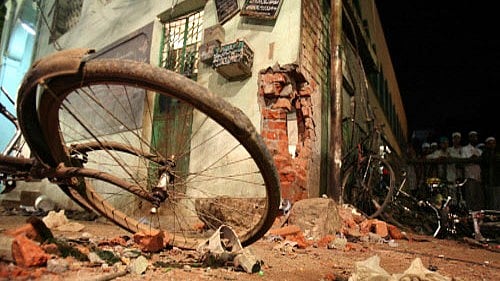
Maharashtra's Malegaon on a quiet September day in 2008, killing six people and injuring more than 100.
Credit: Reuters File Photo
The acquittal of all seven persons charged by the National Investigation Agency (NIA) in the 2008 Malegaon blasts case, in which six people were killed, soon after the acquittal of all accused in the 2006 Mumbai train blasts case, is yet another sign of the failure of investigators and prosecutors to ensure delivery of justice in important cases. In both cases, the courts cited lack of evidence and shoddy investigation as the reasons for the acquittals. While in the Mumbai blasts case, the court noted serious lapses such as forced confessions and tutoring of witnesses, in the Malegaon case, a special court observed that a grave degree of suspicion was established, but not enough was on hand to merit a conviction. So the court gave the accused the benefit of the doubt. In both cases, the process took long years.
The Malegaon case saw many twists and turns and they aligned with political and governmental changes. The Maharashtra Anti-Terrorism Squad (ATS), led by the late Hemant Karkare, arrested individuals linked to the right-wing Hindu group Abhinav Bharat, including former BJP MP Sadhvi Pragya Singh Thakur. Congress-led governments ruled in Maharashtra and at the Centre at that time and the term ‘’saffron terror’’ had gained currency. The case was later transferred to the National investigation Agency (NIA). The investigation saw changes after this. The NIA dropped charges against some accused. Questions were raised about the evidence. As many as 37 witnesses turned hostile during the trial. The then Special Public Prosecutor Rohini Salian alleged in public that she had been told by the NIA to “go soft” on the accused—she resigned from her position.
It amounts to grave injustice to hold people in jail for long periods, only to acquit them later. The families of the people who lost their lives, the injured, and the nation at large are denied justice when cases drag on for years and convictions are elusive. Many terrorism-related cases have failed in the past. There is still no closure to the cases relating to the 2006 Malegaon blasts in which 37 people were killed, the 2007 Samjhauta Express blasts which killed 68, the 2007 Hyderabad Mecca Masjid blasts that killed nine, and the 2007 Ajmer Dargah Sharif blasts that claimed three lives. The nation is unlikely to know the full truth about these cases. Maharashtra’s Devendra Fadnavis government moved the Supreme Court against the acquittals in the Mumbai train blasts case, but the NIA has not said it would appeal the acquittals in the Malegaon case. Whether the reason for the acquittals is incompetence, partisanship, prejudice, or political interference, they show how the justice system is rendered dysfunctional in important cases.
